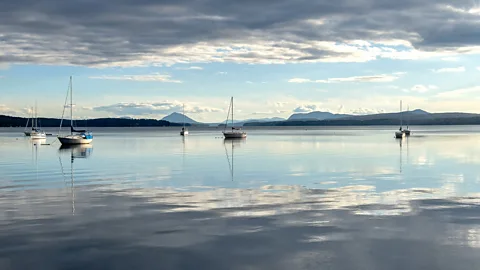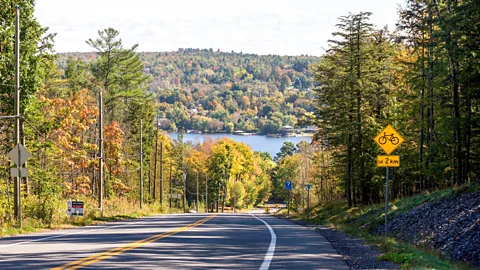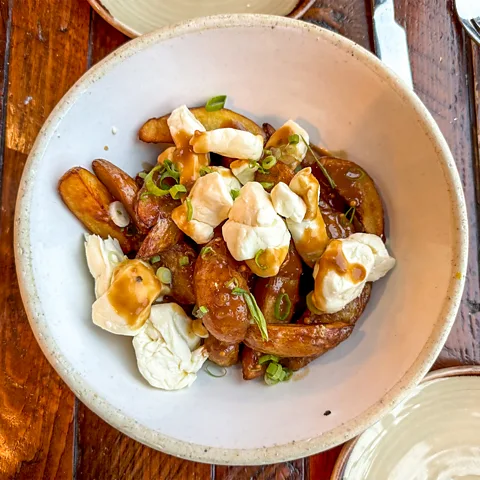The Véloroute Gourmande: Canada’s delectable 235km food trail
Launched in 2022, the new path threads Québec’s bucolic villages and lake-laced landscapes, passing more than 100 culinary stops from Montréal to Sherbrooke.
Once, in 2019 – uncomfortably perched on a borrowed, oversized bike – I rode 42km on a windswept, gravel causeway built atop an old train line that cuts through the waters of New England’s Lake Champlain.
Based on that experience, and a leisurely 32km pedal near my Vermont home recently, I decided to hop on a Greyhound bus to Montréal with my sister, a more experienced biker, and spend five days tackling the Véloroute Gourmande: a 235km paved and gravel cycling trail connecting Montréal and the city of Sherbrooke in southern Québec.
That’s how I found myself sopping wet from unrelenting rain, wearing padded bike shorts beneath running tights, multiple shirts under a rain jacket and dripping onto the wooden floorboards of one of the most charming coffee shops I’ve ever entered, Yamaska Café in Farnham, Québec. I’m not yet an intermediate rider, but I’m certainly a stubborn beginner. And a hungry one.
Luckily, I was – quite literally – on the right track. Launched in April 2022, the Véloroute Gourmande passes more than 100 culinary stops, from farmers’ markets and vineyards to casual pubs and elegant farm-to-table restaurants, as it threads through the region’s bucolic villages and lake-laced landscape. As a food writer, goose farmer, cooking teacher and restaurant chef, I was keen to turn my attention from the woods where I forage for wild mushrooms and my garden, which abounds with heirloom tomatoes, uncommon herbs and edible flowers, north to explore the culinary heritage of the Québecois countryside.
 Suzanne Podhaizer
Suzanne PodhaizerMuch of the trail follows a portion of the Route Verte, whose 5,300km crisscross Québec and comprise the longest network of cycling paths in North America. But aside from its length, the main difference between the two routes is that the Véloroute Gourmande was essentially designed as a slow travel food tour. While pedalling across Québec’s countryside, cyclists can stop to refuel on gravy-slicked French fries, tarts filled with blueberry jam, coffee gussied up with maple syrup or booze flavoured with boreal herbs, forest mushrooms or wildflowers.
The Véloroute’s interactive map features 120 icons – including tiny forks, beer glasses and squat jam jars – that denote places to stop for things like golden panini stuffed with house-cured ham and bloomy rind cheese, dark ale delicately scented with spruce tips or wedges of cheese to squash into one’s panniers and nosh by the side of the road.
Despite its name, this “Gourmande” trail isn’t merely culinary. Organisers also offer suggestions on elegant hotels and charming B&Bs, culturally important sites – such as a Le Vieux Clocher concert hall in Magog and a defunct copper mine that offers underground tours – and every bike shop along the way, in case your derailleur gets derailed on the rail trail.
Although it’s possible to tackle the route in either direction, the Véloroute website suggests starting in Montréal and riding east. Given that Montréal is the most likely arrival point for out-of-towners and the biking closest to the city is easiest (read: flatter), allowing cyclists to build up to the longer, hillier days, this makes good sense. Riding east also provides a better chance at a tailwind, although it does increase the climbing by 150m.
 Suzanne Podhaizer
Suzanne PodhaizerThe initial segment, a 45km pedal from Montréal to the city of Saint-Jean-sur-Richelieu, contains 55 of the route’s 120 culinary pit stops. In order to pack in more dining, we gave ourselves an extra day to cover the first leg.
As a chef, I’ve typically planned my travels around culinary explorations. Over time, I’ve developed strategies for sniffing out the finest fare, from comforting and casual to exquisite. However, I’ve never before been limited to the places I could get to with only pedal power.
I narrowed down the options in two ways. First, I eliminated places that would be closed when I passed by, including farmers’ markets that are open for just four hours per week. Next, I looked for stops that highlight the best of what Québec has to offer, ignoring otherwise appealing ramen shops and Italian restaurants. The region’s modern cuisine leans heavily on its French-occupied history – think buttery pastries, French onion soup and crêpes rolled around sweet or savoury fillings. These items are complemented by fare that might be fit to take along while logging or fur trapping, such as long-lasting hard cheeses and charcuterie, and spiced meat hand pies.
As a rule, restaurants with massive menus often rely on frozen and premade goods, so I nixed those, even if they tantalised with mentions of Québecois fare such as poutine, steak or salmon tartare or custard-y maple syrup pie. Briefer menus that mentioned the use of local or seasonal ingredients, and featured those same classic items, made the list.
 Suzanne Podhaizer
Suzanne PodhaizerOnce I had my itinerary, we set out. Biking east, we travelled along the mighty St Lawrence River, passing decaying factories, building-sized cruise ships and the two islands that make up Parc Jean-Drapeau, which features a ferris wheel, a geodesic dome that looks like a massive soap bubble and Montréal’s slick Formula 1 racing circuit.